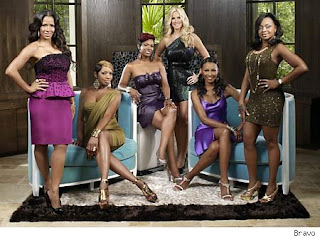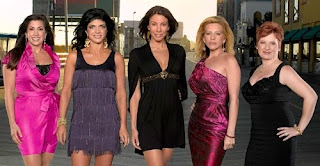The cable network Bravo is known for having some of the most racy and controversial reality TV shows out there but the Real Housewives series really "takes the cake" in my opinion. I have never kept up with an entire season but I have watched bits and pieces of the show. I often times find myself watching for longer than anticipated because I see these grotesquely rich females parading around in their fancy cars, partaking in high class drama, and squandering on all day shopping sprees and wonder is this REAL life?
The entertainment purpose of the show is not only the riveting high-profile drama that occurs in the swanky restaurants of New York or the exclusive conventions in Atlanta but rather the fact that most people cant even relate to the lifestyle of these individuals in the slightest bit. Although the show is more likely geared towards an on older female audience I will admit that the show has some entertainment value mostly because most normal level headed people like myself love nothing more than critiquing these individuals every dreaded move and making fun of them; the beauty of reality television. It’s amazing how the stereotypical affluence in housewives is represented in a different cultural and geograpphical environment every season. This is exhibited by the pictures of the casts in various seasons below.

The housewives of Atlanta are predominantly African American and much of the show is centered around the African American culture of Atlanta. Name of the housewives are as follows:NeNe Leakes, Kim Zolciak, Sheree Whitfield, Kandi Burruss, Phaedra Parks, Cynthia Bailey.

Notice how the cast becomes considerably more white and their are no African American housewives in this season. Instead the show tries to exploit the stereotypical "jersey girl" with thick jersey accents and other "jersey" mannerisms.Names of the housewives:Teresa Giudice, Caroline Manzo, Jacqueline Laurita, Melissa Gorga, Kathy Wakile.

Being consistent with the other geographically stereotypical seasons Bravo features a group of Miami housewives that are very "Sofla" portraying Spanish women with broken accents and a more tanned and brown skinned cast. Names of the housewives:Larsa Pippen, Adriana De Moura, Marysol Patton, Lea Black, Alexia Echevarrrria, Cristy Rice.
The representations of class are consistent across seasons, featuring some of the wealthiest housewives in American and revealing them as rather "classless" individuals. The Bravo series clearly reinforces many of the racial and class oriented norms of American society to the point where it becomes visually shocking; thus providing entertainment for the masses and the ratings to continue an otherwise awful television show.











